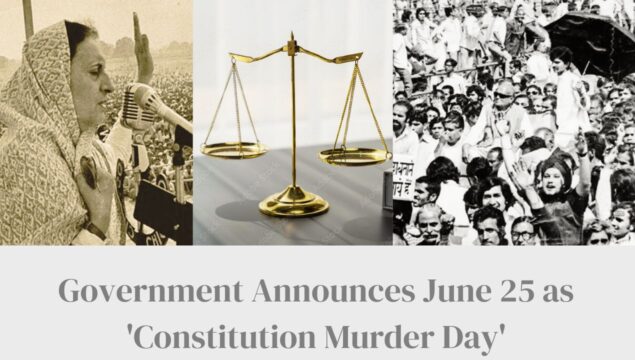“Samvidhan Hatya Diwas: Government Announces June 25 as a Day to Remember the 1975 Emergency”
In a significant move, the Government of India has announced that June 25 will now be observed annually as ‘Samvidhan Hatya Diwas’ or ‘Constitution Murder Day’. The declaration, made on July 12, 2024, comes in remembrance of the imposition of the national emergency on June 25, 1975, by the then Prime Minister Indira Gandhi. This year marks the beginning of the 50th year since this event, a period marked by severe restrictions on civil liberties and democratic rights in India.
Historical Background of the Emergency
The Genesis of the Emergency
The imposition of the emergency on June 25, 1975, was a direct consequence of the Allahabad High Court’s verdict on June 12, 1975. The court found Indira Gandhi guilty of electoral malpractices and declared her election to the Lok Sabha from the Rae Bareli constituency null and void. This decision barred her from holding any elected office for six years.
Political Turmoil and the Decision to Impose Emergency
Following the court’s decision, the opposition, led by Jayaprakash Narayan, initiated nationwide protests demanding Indira Gandhi’s resignation. These protests intensified, leading to a call for the police and military to defy government orders. The government perceived these actions as a significant threat to India’s internal security, ultimately leading to the imposition of the emergency under Article 352 of the Constitution.
Constitutional Provisions and Amendments
Article 352: National Emergency
Article 352 of the Indian Constitution empowers the President to declare an emergency if there is a threat to the country’s security due to war, external aggression, or armed rebellion. Initially, the term used was ‘internal disturbance,’ which was later amended to ‘armed rebellion’ by the 42nd Constitutional Amendment in 1978.
Changes Brought by the 44th Constitutional Amendment
In response to the abuses during the emergency, the subsequent Janata Party government led by Morarji Desai introduced the 44th Constitutional Amendment Act in 1978. Key changes included:
- The President could declare an emergency only based on the written advice of the Union Cabinet.
- The term ‘internal disturbance’ was replaced with ‘armed rebellion’.
- The emergency declaration required approval by Parliament within one month by a simple majority, instead of the earlier two months with a special majority.
- Fundamental rights, except those under Articles 20 and 21, could be suspended during an emergency.
Articles 20 and 21: Protection and Rights
Article 20 provides protection against conviction for offenses, while Article 21 guarantees the right to life and personal liberty unless deprived by law.
Announcement and Significance of ‘Samvidhan Hatya Diwas’
Government’s Statement
Union Home Minister Amit Shah announced the observance of June 25 as ‘Samvidhan Hatya Diwas’ to honor those who suffered during the emergency. He highlighted the importance of remembering this period to prevent future abuses of power. The government aims to pay tribute to the people who opposed the emergency and faced imprisonment and other hardships as a result.
Prime Minister Narendra Modi’s Remarks
Prime Minister Narendra Modi emphasized that the observance of ‘Samvidhan Hatya Diwas’ serves as a reminder of the severe impact of the emergency on Indian democracy. He described the period as a dark phase unleashed by the Congress government and stressed the importance of remembering the victims and their contributions to safeguarding democracy.
Opposition’s Reaction
The Congress party, on the other hand, criticized the government’s decision. Senior Congress leader Jairam Ramesh labeled it as a publicity stunt by the Bharatiya Janata Party (BJP) and accused Prime Minister Modi of imposing an undeclared emergency during his tenure. Ramesh referred to June 4, 2024, as ‘Modi Mukti Diwas,’ marking the end of Modi’s alleged ten-year undeclared emergency.
The Emergency’s Legacy and Impact
Suspension of Civil Liberties
During the emergency, the Indira Gandhi government suspended fundamental rights, detained opposition leaders, and imposed censorship on the press. The period was marked by widespread human rights violations, including mass arrests and suppression of political dissent.
Restoration of Democracy
The emergency was eventually lifted on March 21, 1977, following which elections were held. The Congress party was defeated, and the Janata Party, led by Morarji Desai, came to power. This period of democratic revival was marked by significant constitutional amendments aimed at preventing future abuses.
Long-term Changes in Governance
The emergency period and its aftermath led to a greater emphasis on safeguarding democratic institutions and processes in India. The amendments introduced post-emergency have continued to shape the country’s political and legal landscape, ensuring that such an event does not recur.
Conclusion
The declaration of June 25 as ‘Samvidhan Hatya Diwas’ by the Government of India is a significant step in remembering a critical period in the country’s history. It serves as a reminder of the importance of upholding democratic values and preventing abuses of power. As the country marks this day annually, it pays tribute to those who fought for the restoration of democracy and honors their contributions to India’s constitutional framework.
Get Your Exam-Ready FAQs Here
Q1: What is the significance of June 25 in Indian history?
A1: June 25 marks the day in 1975 when Prime Minister Indira Gandhi declared a national emergency in India, leading to the suspension of civil liberties and democratic rights.
Q2: Why has the Indian government decided to observe June 25 as ‘Samvidhan Hatya Diwas’?
A2: The government has declared June 25 as ‘Samvidhan Hatya Diwas’ to honor those who suffered during the emergency period and to remind citizens of the importance of safeguarding democracy and constitutional values.
Q3: Who announced the decision to observe ‘Samvidhan Hatya Diwas’?
A3: Union Home Minister Amit Shah announced the decision on July 12, 2024.
Q4: What was the duration of the emergency imposed by Indira Gandhi?
A4: The emergency lasted from June 25, 1975, to March 21, 1977.
Q5: What constitutional article was invoked to impose the emergency in 1975?
A5: The emergency was imposed under Article 352 of the Indian Constitution.
Q6: What changes were made to the emergency provisions by the 44th Constitutional Amendment Act, 1978?
A6: The 44th Constitutional Amendment introduced several changes, including requiring the President to declare an emergency only on the written advice of the Union Cabinet, substituting ‘internal disturbance’ with ‘armed rebellion’, and necessitating parliamentary approval within one month.
Q7: How did the Congress party react to the declaration of ‘Samvidhan Hatya Diwas’?
A7: The Congress party criticized the move, calling it a publicity stunt by the BJP and accusing Prime Minister Modi of imposing an undeclared emergency during his tenure.
Q8: What was the role of the Allahabad High Court in the events leading to the emergency?
A8: On June 12, 1975, the Allahabad High Court found Indira Gandhi guilty of electoral malpractices and invalidated her election, which contributed to the decision to impose the emergency.
Q9: How did Prime Minister Narendra Modi describe the observance of ‘Samvidhan Hatya Diwas’?
A9: Prime Minister Modi described it as a reminder of the dark period when the Constitution was trampled and a tribute to those who fought against the emergency’s abuses.
Q10: What rights were suspended during the emergency, and which rights were protected?
A10: During the emergency, most fundamental rights were suspended except those provided under Articles 20 and 21, which protect against conviction for offenses and guarantee the right to life and personal liberty, respectively.
OTHER LINKS:
👉 To know how Jasprit Bumrah and Smriti Mandhana made history, check out the full story on their ICC Player of the Month June 2025 win for India here.





